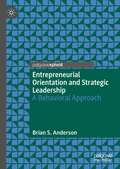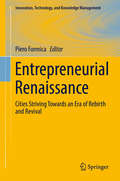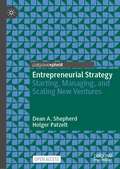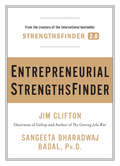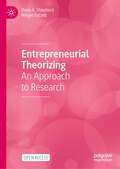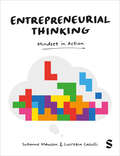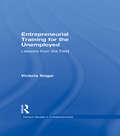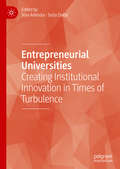- Table View
- List View
Entrepreneurial Orientation and Strategic Leadership: A Behavioral Approach
by Brian S. AndersonThis book sits at the intersection of two lines of inquiry of critical importance to management researchers—what are the contributory factors to building an entrepreneurial company, and what is senior leadership’s role in this process? Inherently cross-disciplinary, it adopts a behavioral perspective and proposes a research model delineating how various strategic leadership variables influence a firm’s exhibition of entrepreneurial behaviors, captured by the entrepreneurial orientation (EO) construct.While EO research touches briefly on the role of the CEO senior leadership consideration, the field lacks an integrated perspective on how senior leadership decisions enable or constrain EO. To address this gap, the author proposes resource allocation decisions as the central mechanism through which a set of strategic leadership variables causally influence EO. He argues for the superiority of a behavioral view of EO and of strategic leadership, which stands in contrast to the attitudinal perspective on EO and the ex officio perspective on strategic leadership.Opening a rich new stream of inquiry on leadership antecedents to EO, this work will appeal to both entrepreneurship and leadership researchers, unpacking both research gaps and research questions concerning the role of the CEO and top management team, corporate boards, and emerging leadership challenges.
Entrepreneurial Profiles of Creative Destruction: Courage, Imagination And Creativity In Action
by Don Stewart Elias G. Carayannis Caroline Sipp Thanos VenierisEntrepreneurial Profiles is intended to help students and practitioners of entrepreneurship think about what it takes to create a significant business, with focus on what it may take to create a successful and significant business.
Entrepreneurial Renaissance
by Piero FormicaThis book explores the parallels between the Renaissance during the 14th to 16th centuries and the upheavals in human and physical sciences in the 21st Century that herald an insurgent entrepreneurial renaissance. The first Renaissance, conceived and developed in an urban environment, with the Medici family in Florence as pioneers, was a melting pot of art, culture, science and technology. It is in that context that entrepreneurship derived from artisan tradition and, hence, customized, was born to meet the demands and anticipate the needs of individual consumers. Starting with the mechanical technologies of the first industrial revolution, art, culture and science became separated from entrepreneurship. The latter took on Fordist features which depersonalized and, therefore, standardized the producer-consumer relationship. The emerging model of entrepreneurship returns to its origins in customization (e. g. , 3D printing technologies, sharing/on-demand economy) strongly linked to the sequence "art-culture-science-technology. " The road to a new entrepreneurial renaissance is traveled by cities with creative communities. These communities actively participate in promoting international talent mobility, encouraging connections among the knowledge nomads who move around the world and the resources and talents rooted locally. Brought back to life under the conditions of the current age, entrepreneurship is once again woven into the fabric of art, culture, science and technology, and contributing to civic identity and pride. Featuring case studies from local experts that highlight innovative initiatives and developments in diverse cities around the world, this book aims to stimulate deep thought, theories and applications in the fields of entrepreneurship and innovation.
Entrepreneurial Responses to Chronic Adversity: The Bright, the Dark, and the in Between
by Dean A. Shepherd Vinit Parida Joakim WincentThis open acess book extends recent work on entrepreneurship in response to adverse events to explore entrepreneurial responses by people who face chronic adversity more deeply. Instead of focusing on the sort of responses intended to destroy the institutions that create and sustain chronic adversity, the authors are interested in how individuals use entrepreneurial action to find a way within these adverse constraints to improve their lives. They explore the positive outcomes arising from these entrepreneurial actions for the entrepreneurial actor and their family members as well as the negative consequences of these entrepreneurial responses to chronic adversity—outcomes that diminish others’ well-being. The book relies on the lived experiences of those facing chronic adversity to provide insights into the bright—and dark—sides of entrepreneurship and the complexity of these relationships. It will serve as a valuable resource to scholars seeking to understand how entrepreneurial action is conceived and implemented by those facing challenging resource-poor environments.
Entrepreneurial Sales and Marketing Vignettes
by Frank V. Cespedes Mark RobergeWhich sales candidate is a startup's ideal first hire? What marketing channels are best to invest in? How aggressively should an executive team align sales with customer success? Early stage founders, sales leaders, and marketing executives often face one, and sometimes all, of the above scenarios as they grow their ventures. This case presents three short vignettes, with three fictitious organizations, to facilitate a discussion around these important decisions.
Entrepreneurial Seoulite: Culture and Subjectivity in Hongdae, Seoul (Perspectives On Contemporary Korea)
by Mihye ChoEntrepreneurial Seoulite might be read as a memoir on Hongdae based on the author’s observations as a member of South Korea’s Generation X. During the 1990’s, Hongdae became widely known as a cool place associated with discourses on alternative music, independent labels, and club culture. Today, Hongdae is well known for its youth culture and nightlife, as well as its gentrification. Recent research on Korean culture approaches the K-wave phenomenon from the perspectives of cultural consumption, media analysis, and cultural management and policy. Meanwhile, studies on Seoul have centered on its transformation as a global, creative city. Rather than examining the K-wave or the city itself, this book explores the experience of living through the city-in-transition, focusing on the relationship between “the ideology that justified engagement in capitalism” and the “subjectification process.” The book aims to understand the project to institutionalize a cultural district in Hongdae as a demonstration of the coevolution of ideologies and citizenship in a society undergoing rapid liberalization—politically, culturally, and economically. A cultural turn took place in Korea during the 1990s, amid the economic prosperity driven by state-led industrialization and the collapse of the military dictatorship due to democratization movements. Cultural critiques, emerging as an alternative to social movements, proliferated to assert the freedom and autonomy of individuals against regulatory systems and institutions. The nation was hit by the Asian financial crisis in 1997, and witnessed massive economic restructuring including layoffs, stakeouts, and a prevalence of contingent employment. As a result, the entire nation had to find new engines of economic growth while experiencing a creative destruction. At the center of this national transformation, Seoul has sought to recreate itself from a mega city to a global city, equipped with cutting-edge knowledge industries and infrastructures. By juxtaposing the cultural turn and cultural/creative city-making, Entrepreneurial Seoulite interrogates the formation of new citizen subjectivity, namely the enterprising self, in post-Fordist Seoul. What kinds of logic guide individuals in the engagement of new urban realities in rapidly liberalized Seoul—culturally and economically? In order to explore this query, Mihye Cho draws on Weber’s concept of “the spirit of capitalism” on the formation of a new economic agency focusing on the re-configuration of meanings, and seeks to capture a transformative moment detailing when and how capitalism requests a different spirit and lifestyle of its participants. Likewise, this book approaches the enterprising self as the new spirit of post-Fordist Seoul and explores the ways in which people in Seoul internalize and negotiate this new enterprising self.
Entrepreneurial Small Business
by Jerome A. Katz Green Richard PEntrepreneurial Small Business (ESB) focuses on traditional “main street” businesses versus high-growth firms dependent on venture capital. It presents the realities small business owners face and strategies for those starting or maintaining a small business. ESB combines the art of small business survival with the science of small business success, to provide students the tools and knowledge they need to go out and start their own small businesses. ESB features practical advice and experiential learning. Informed by nearly 180 journals in entrepreneurship, the authors make the best of modern wisdom easy to understand and easy to apply. With one of the largest collections of experiential learning techniques, ESB gives students the hands-on experience they need to start their small business with over 100 end-of-chapter experiential exercises, 59 skill modules, mini-cases, business model canvases and business plans.
Entrepreneurial Small Business
by Jerome Katz Richard P. GreenEntrepreneurial Small Business (ESB) provides students with a clear vision of small business as it is today. ESB focuses on the distinctive nature of small businesses that students might actually start versus high growth firms. The authors of ESB incorporate the latest findings and best practices from academic and consulting arenas, and recognize the distinction between entrepreneurs who aim to start the successor to Amazon.com or the pizza place around the corner. Entrepreneurial Small Business focuses on the small businesses students might actually start.
Entrepreneurial Strategy: Starting, Managing, and Scaling New Ventures
by Dean A. Shepherd Holger PatzeltThis open access book focuses on explaining differences amongst organizations regarding various attributes, forms, and outcomes. By focusing on the “how” of new venture creation and management to produce well-established organizations, the authors aim to increase our understanding of the antecedents of most management research assumptions. New ventures are the source of most newly created jobs generated in an economy, new industries and markets, innovative products and services, and new solutions to economic, social, and environmental problems. However, most management research assumes a well-established organization as the starting point of their theorizing.Building on the notion of guided attention, it details how entrepreneurs can allocate their transient attention to identify potential opportunities from environmental change and how entrepreneurs allocate their sustained attention to form beliefs about radical and incremental opportunities requiring entrepreneurial action. The authors explain how entrepreneurs build such communities and engage community members over time to co-construct potential opportunities for new venture progress. Using the lean startup framework, they connect the dots between the theorizing on identifying and co-constructing potential opportunities and the startup of new ventures. This leads to a new overarching framework based on are (1) co-creating a startup, (2) organizing a startup, and (3) performing a startup to bring together the many disparate threads of research on new ventures. The authors then theorize on the importance of knowledge in organizational scaling. Based on cutting-edge research from the leading entrepreneurship journals, this book expands knowledge on the cognitive aspect of the new venture creation process.
Entrepreneurial StrengthsFinder
by Jim Clifton Sangeeta Bharadwaj BadalEntrepreneurial StrengthsFinder delves into the psychology of the entrepreneur. Gallup research shows that decisions and actions, influenced by the personality of the entrepreneur, impact the survival and growth of the venture.Entrepreneurial StrengthsFinder is about understanding what drives entrepreneurs to start, sustain, and grow a successful company. What are the personality characteristics and behaviors that lead to venture creation and success? Can one learn to be an entrepreneur, or are you born with it? The book attempts to answer these questions with the hope that if you are planning to start a business or are managing one, you can discover your entrepreneurial talents and in the process, increase your potential to start or grow your venture.Written in an engaging, conversational style, Entrepreneurial StrengthsFinder includes strategies and action items for building successful ventures. It also features an online test that measures readers' entrepreneurial potential.Entrepreneurial StrengthsFinder is meant for several audiences - from those who are planning to start or grow a business to investors and coaches who can help identify talent and then foster and support that talent to start or grow a business.
Entrepreneurial Teams as Determinants of of New Venture Performance (Garland Studies in Entrepreneurship)
by Michael D. EnsleyFirst Published in 1999. Routledge is an imprint of Taylor & Francis, an informa company.
Entrepreneurial Theorizing: An Approach to Research
by Dean A. Shepherd Holger PatzeltThis open access book investigates an entrepreneurial approach to building new theories. It provides a rich understanding of how specific tools facilitate aspects of the theorizing process and offers a clearer big picture of the process of building important new entrepreneurship theories. The authors show that anthropomorphizing has been a critically important tool for developing influential entrepreneurship theories. They reveal how scholars build on their rich and highly accessible understanding of humans (i.e., the self and others) to make guesses and sense of entrepreneurial anomalies, articulate theoretical mechanisms to build more robust entrepreneurship theories, and create plausible stories that facilitate sensegiving. Further, they offer a framework that guides entrepreneurship scholars in finding a balance to maximize their contributions and guides reviewers and editors in managing the revise-and-resubmit process to advance the entrepreneurship field. Finally, they present lean scholarship as an approach to developing a portfolio of high-quality, high-impact papers. Lean scholarship starts with an entrepreneurial mindset and involves creating a minimum viable paper, exploring its validity, adding a plausible paper to one’s portfolio, and managing the portfolio by periodically deciding whether to persevere, pivot, or terminate each paper. This seminal work will appeal to entrepreneurship researchers, both those new to the field as well as seasoned veterans, who want to learn more about the tools that can be used to generate new knowledge about new ventures and other entrepreneurship topics.
Entrepreneurial Thinking: Mindset in Action
by Suzanne Mawson Lucrezia CasulliEntrepreneurship is not just about building businesses: it encompasses a set of skills, competencies and linked behaviours to support the creation of new ideas to create value. Entrepreneurial thinking is relevant across all aspects of life, personal and professional, and closely linked to both employability and life skills. This new textbook, via an array of pedagogical features, quizzes and worksheets, guides you in developing your own entrepreneurial thinking skills to support the development of ideas to tackle problems and challenges for yourself, for organisations and for society generally. It will challenge you to look beyond standard narratives of ‘heroic’ entrepreneurial individuals to identify how you yourself can become a creator of value in our volatile, uncertain, complex and ambiguous world. Suzanne Mawson is an Associate Professor of Entrepreneurship at the University of Strathclyde Business School. Lucrezia Casulli is an Associate Professor of Entrepreneurship at the University of Strathclyde Business School.
Entrepreneurial Thinking: Mindset in Action
by Suzanne Mawson Lucrezia CasulliEntrepreneurship is not just about building businesses: it encompasses a set of skills, competencies and linked behaviours to support the creation of new ideas to create value. Entrepreneurial thinking is relevant across all aspects of life, personal and professional, and closely linked to both employability and life skills. This new textbook, via an array of pedagogical features, quizzes and worksheets, guides you in developing your own entrepreneurial thinking skills to support the development of ideas to tackle problems and challenges for yourself, for organisations and for society generally. It will challenge you to look beyond standard narratives of ‘heroic’ entrepreneurial individuals to identify how you yourself can become a creator of value in our volatile, uncertain, complex and ambiguous world. Suzanne Mawson is an Associate Professor of Entrepreneurship at the University of Strathclyde Business School. Lucrezia Casulli is an Associate Professor of Entrepreneurship at the University of Strathclyde Business School.
Entrepreneurial Training for the Unemployed: Lessons from the Field (Garland Studies in Entrepreneurship)
by Victoria SingerFirst Published in 1999. Routledge is an imprint of Taylor & Francis, an informa company.
Entrepreneurial Universities
by Marta Peris-Ortiz José M. Merigó-Lindahl Carlos Rueda-Armengot Jaime Alonso GómezThis book analyses the importance of the entrepreneurial university, specifically in relation to the creation of entrepreneurial ideas and attitudes in students and entrepreneurial initiatives in academic institutions. The aim of the editors and contributing authors is to provide the reader with a set of experiences illustrating the advantages of communicating and encouraging entrepreneurship among students, thereby highlighting the "third mission" of the university: the need to adopt entrepreneurial strategy without disrupting the quality of teaching and research. Featuring initiatives from institutions around the world, the authors argue that the increasing importance of knowledge in the technical and social dimensions of today's world provides greater relevance to the entrepreneurial university. In this context, universities transcend their traditional focus on teaching and basic research to carry out technology transfers, marketing ideas, and patent registrations, and incorporate spin-off companies that contribute to industrial innovations, economic growth, and job creation. In the teaching dimension, the entrepreneurial university represents a focus on programs which train students in the applications and most advanced practices in knowledge-driven fields. The book addresses such questions as: Can marketing ideas deteriorate the quality of research in the long term? What importance does the cultural framework have for an entrepreneurial education? What circumstances and programs facilitate spin-offs in universities What are the key features of entrepreneurial universities? In reference to entrepreneurship education in its broadest sense, then, it corresponds to the framework of ideas and general features on which entrepreneurship is founded: in-depth knowledge of the projects or ventures which they wish to carry out, capacity to perceive the relevant characteristics of the environment, and the leadership and goal setting skills to achieve success.
Entrepreneurial Universities: Creating Institutional Innovation in Times of Turbulence
by Surja Datta Sola AdesolaThis book explores the idea of the ‘Entrepreneurial University’ within the institutional environment that focuses on the production, dissemination, and exploitation of knowledge. Keeping its gaze firmly on the constitutive elements of the knowledge-based institutional environment – the key actors and their interactions – the book makes important theoretical and empirical contributions to the burgeoning literature on academic entrepreneurship. The contributing chapters in the book draw insights from a range of disciplines including history, institutional and evolutionary economics, strategic management, entrepreneurship, and innovation studies to explore how institutions can create new business opportunities in turbulent times. This interdisciplinary approach has generated a rich and diverse set of insights on the idea of Entrepreneurial Universities for students, researchers, practitioners and policymakers interested in innovation and technology studies, entrepreneurship, and knowledge management.
Entrepreneurial Urban Regeneration: Business Improvement Districts as a Form of Organizational Innovation (Routledge Focus on Business and Management)
by Rezart Prifti Fatma JaupiIn today's world, towns and cities dynamically develop over time and that's why urban regeneration is a widely experienced phenomenon. How can Business Improvement Districts (BIDs) create necessary conditions for the development of these phenomena? What is the role that BIDs have in entrepreneurial urbanism, supporting SMEs, city marketing and city branding? These are questions examined in this volume, in an effort to provide an extensive analysis of business improvement districts. Enriched with an analysis of various case studies, including South Africa, Ontario, Tokyo, Barcelona, Slovenia and with an in-field analysis of a cultural heritage site, Korca, Albania, the book analyses the importance, benefits, and impacts of this kind of organization. It highlights the social, economic and ecologic challenges to the historic city markets today, which led to their rapid stagnancy. This book offers a practical and structured guide of the concept of Business Improvement Districts and highlights the best practices for management, financing and organizing. It sheds light on the impacts and benefits of business improvement districts, offering conclusions about their influence on the future improvement of cultural and urban sites. It will be of value to researchers, academics, professionals, and students in the fields of management, organizational studies, strategy, and sustainable development of tourism districts.
Entrepreneurial Urbanism in India
by Kanekanti Chandrashekar SmithaThrough the analysis of Indian metropolises, this volume critiques the reality of "entrepreneurial governance" that has emerged as a major urban development practice in cities of the global south. In neoliberal India, the use of management rhetoric in urban development has rapidly led to the growth of urban/peri-urban structures and spaces that are supposedly "smart" and "entrepreneurial", which are networked within global systems of production, finance, technology/ telecommunication, culture and politics. Through diverse empirical evidence from India, particularly from the metropolises of New Delhi, Mumbai, Bengaluru and Chennai, this volume focuses on the fallout of the deployment of "entrepreneurial governance" practices at national, state and local levels. Foremost, it explores the impact of specific institutional and organizational reorientations and changing urban spatial landscapes at the local level; secondly, it discusses the socio-economic implications of rollback of the state and involvement of non-state organizations in governance as part of urban entrepreneurialism; further, it discusses the regulation of urban development projects by local governments and the impact of "entrepreneurial governance" for citizens, often resulting in social exclusion and inequality. Finally, it explores the inherent contradictions within political and institutional landscapes that can be described as "entrepreneurial". Written by scholars from diverse disciplinary backgrounds, and focusing on different facets of entrepreneurial governance in Indian metropolises, this book is of interest to researchers of urban politics, public policy, urban sociology, anthropology, urban geography, planning and architecture.
Entrepreneurial Values and Strategic Management
by Vittorio CodaVittorio Coda's discussion of the goals and purpose of the business enterprise illuminates the long-running debate over the goals of the firm. His conceptualization of the firm and its relationships within society transcends stale arguments over shareholders versus stakeholders by viewing the firm less as an agent of individual interests and more as an engine of social development that unifies the interests of the different participants. In articulating a model of the entrepreneurial firm embedded in a social system and a values system based upon notions of fairness and social responsibility, Coda offers an original approach to interpret the business system. The view of a socially-responsible, entrepreneurial, business sector surfacing in this book offers an attractive alternative to most of the prevailing models of market capitalism that have attracted criticism over the past decades.
Entrepreneurial Vision: A Guide for Charting and Implementing the Visioning Process (Classroom Companion: Business)
by Susan E. Reid Charles B. CrawfordWhile many texts on entrepreneurship and biographies of great entrepreneurs and leaders talk about vision and its importance, few delve into what vision is, how it comes to be, and, how it can be more successfully developed. This book, built on evidence-based research, delves into the entire entrepreneurial visioning process. Starting with understanding the elements which characterize strong and sustainable vision, the authors detail proposed steps, supported by examples and worksheets, that students and entrepreneurs can take to build and implement their vision and, in turn, help put them on the path to build great businesses.
Entrepreneurial Wellbeing: Perspectives in SMEs based on Gender and Immigrant Entrepreneurs
by Jeremy Zwiegelaar Beck ShelleyWellbeing is an integral part of living a fulfilled life. It is intimately related to people's capacity to work and maintain positive relationships. Wellbeing plays an important role in scholarly conversations and public policy debates. In this respect, entrepreneurship can be a source of personal fulfillment and satisfaction, which, in turn, can energise entrepreneurs to persist in improbable tasks that can become a force for a positive change in society. For example, new ventures are created by entrepreneurs not only to benefit themselves but to a greater extent to contribute to customers and other multiple key actors in society. Wellbeing is a complex topic that can be taught across a multitude of areas, including psychology, entrepreneurship and health. This book adds to the context of entrepreneurship by highlighting different types of wellbeing. In this book, the focus is placed on SME owners, and wellbeing and various ways of measuring it in different contexts are discussed. The SME owner is a critical stakeholder in economies, and therefore, the highlighted focus is on how they can apply and practically implement strategies linked to wellbeing which is deemed to be essential for business success. Entrepreneurial Wellbeing: Perspectives in SMEs based on Gender and Immigrant Entrepreneurs will provide views on wellbeing for entrepreneurs, students, employees and research audiences and will help them to further understand this multifaceted topic.
Entrepreneurial Women in the Caribbean: Critical Insights and Policy Implications (Palgrave Studies in Equity, Diversity, Inclusion, and Indigenization in Business)
by Talia R. EsnardAdopting an intersectional lens, this book comparatively examines the multiple processes and systems of power that frame the experiences of female entrepreneurs in the Caribbean and the fluid ways in which they respond to these. Specifically, it challenges entrepreneurial scholars who are concerned with the experiences of women within that sector to critically interrogate interlocking structures of power (e.g. gender, race, class, age, industry-based hierarchies) that operate within that space, the marginalizing effects of related processes, and the extent to which these affect their thinking and practices of female entrepreneurs within the region. Through comparative lenses, the book highlights the structural and relational realities and complexities that undergird the entrepreneurial landscape within the region, the effects of these on the entrepreneurial identities, positionalities, and practices of female entrepreneurs. It underscores the many ways in which they navigate that terrain. In so doing, the book offers critical insights into the historical, socio-cultural and economic parameters within which female entrepreneurs in the region engage, the lived realities associated with these, the prospects or possibilities for re-presenting or re-framing such contextual and discursive spaces. It also provides necessary understandings of the motivations, positions, prospects, possibilities and constrains of entrepreneurial women in the region and the policy implications of these realities. This book offers insights for scholars and policymakers that are important for (i) understanding the current gaps in entrepreneurial research and policy, (ii) the tools, methods, and strategies that are needed to address these contextual and discursive realities, and ultimately, (iii) the ways in which policy makers and local governments can promote the authentic empowerment of female entrepreneurs in the region, while giving considerations to precarious realities of women.
Entrepreneurial and Innovative Practices in Public Institutions
by João Leitão Helena AlvesThis volume discusses the importance of adopting entrepreneurial and innovation practices in the public sector, as mechanisms for detecting, dealing with and including citizens' social needs, with a reflection on positive determination of their quality of life. It focuses on critical reflection and rethinking the articulation between the dimensions of transformation - entrepreneurship and innovation - of New Public Management (NPM). In this way the book contributes to deepening knowledge about the implications of this change in the organizational paradigm of the public sector for citizens' quality of life, which is treated multi-dimensionally here, including citizens' well-being, purchasing power, happiness, trust, safety, experience and satisfaction. The volume constitutes a reference guide for decision makers, managers and policy makers engaged in the public sector who want to differentiate their performance by fostering entrepreneurial and innovative practices in the scope of public administration that can enhance citizens' quality of life. This volume is also a reference guide for scholars, policy makers and practitioners interested on public innovation.
Entrepreneurs Creating Educational Innovation: Case Studies From Australia
by Laura HougazThis book examines the contribution of entrepreneurs in diversifying and redefining the tertiary education landscape in Australia. The book explores how and why entrepreneurs have decided to enter a sector which, traditionally, has been predominated by public providers.The book focuses on ways in which entrepreneurs have identified and engaged with opportunities in tertiary education, and created new educational organisations that are also, at the same time, new businesses. In so doing, they have disrupted the tertiary education sector, and their actions are having a major impact on the society, economy and educational profile of Australia, and around the world.
